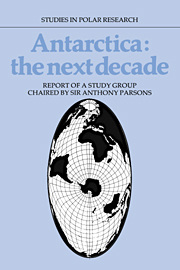Book contents
- Frontmatter
- Contents
- Acronyms
- The Study Group
- Preface
- Political map of Antarctica
- Geographical map of Antarctica
- Part I The Antarctic Treaty System under stress?
- Part II Uses of Antarctica
- 4 Science
- 5 Living resources and conservation
- 6 Mineral resources
- 7 Military potential
- Part III The future
- Appendices
- Notes and references
- Index
7 - Military potential
Published online by Cambridge University Press: 04 August 2010
- Frontmatter
- Contents
- Acronyms
- The Study Group
- Preface
- Political map of Antarctica
- Geographical map of Antarctica
- Part I The Antarctic Treaty System under stress?
- Part II Uses of Antarctica
- 4 Science
- 5 Living resources and conservation
- 6 Mineral resources
- 7 Military potential
- Part III The future
- Appendices
- Notes and references
- Index
Summary
From whatever point of view one approaches the question of possible military interest in Antarctica, either from that of the Antarctic Treaty nations or that of the non-parties, it is as well to start by looking at what is forbidden under the Treaty, and to assume that what is not expressly forbidden is permitted.
Article I of the Treaty is all-embracing: ‘Antarctica shall be used for peaceful purposes only. There shall be prohibited, inter alia, any measure of a military nature, such as the establishment of military bases and fortifications, the carrying out of military manoeuvres, as well as the testing of any type of weapon.’ Article V addresses itself specifically to at least one aspect of nuclear weapons: ‘Any nuclear explosions in Antarctica … shall be prohibited’ [emphasis added]. Article VII insists that advance notice be given of ‘any military personnel or equipment intended to be introduced … into Antarctica’, in effect a confidence-building measure. However, for the purposes of what follows perhaps the most relevant is Article VI: ‘The provisions of the present Treaty shall apply to the area south of 60° South Latitude … but nothing in the present Treaty shall prejudice or in any way affect the rights … of any State under international law with regard to the high seas within that area.’
One might therefore start by asking whether Antarctica, as defined, is an area in which naval vessels, and in particular nuclear-powered ballistic-missile submarines (SSBNs), are permitted to operate.
- Type
- Chapter
- Information
- Antarctica: The Next DecadeReport of a Group Study Chaired by Sir Anthony Parsons, pp. 98 - 108Publisher: Cambridge University PressPrint publication year: 1987

